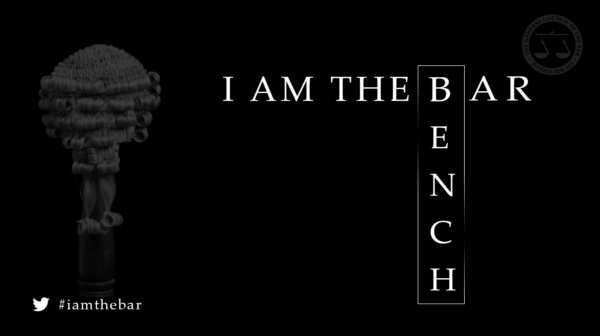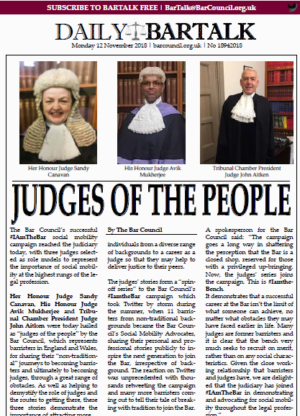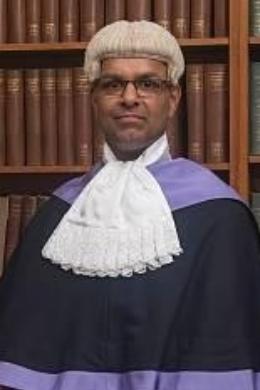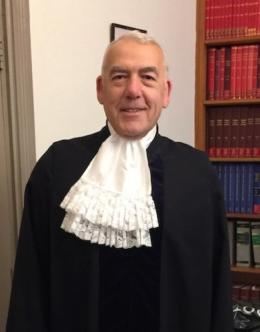Spin-off series: I Am The Bench

In Autumn 2018, the Bar Council's "I am the Bar" campaign extended to a series profiling the judiciary: "I am the Bench".
Three judges shared their stories with us. As well as helping to demystify the role of judges and the routes to getting there, these three stories demonstrate the importance of attracting more individuals from a diverse range of backgrounds to a career as a judge so that they are representative of society when passing judgment on their peers.
See our front page:

Read about their journeys below.

1. Tell us about your background and why you decided to become a judge.
I was brought up in Huddersfield. My parents came to the UK from India in the early 1960s. I had a state education at a decent comprehensive school and decided that I wanted to become an advocate after I started to watch a US TV drama called 'Petrocelli' [he was a US District Attorney]. I was enthralled by the fact that he could present an argument via advocacy and attempt to persuade a judge or jury that his point of view was right. I decided that I wanted to become a barrister during my work placement at the CPS, part of my LLB degree at Nottingham Trent University [then Trent Polytechnic].
I was exposed to barristers on a daily basis and obtained the insight that I needed to take my ambitions to the next level.
I spent 25 years at the Criminal Bar at the same chambers in Nottingham. I was appointed as a Recorder in 2009 [after two attempts] and decided that being a judge was the 2nd career that I wanted. I applied to become a Circuit Judge three times, being appointed on my 3rd attempt in 2015. I loved being a barrister; it was a great career. But by now, I knew that I was more suited to being the referee in the proceedings as opposed to one of the teams involved.
2. What is the most rewarding thing about being a judge; has life at the bench met your expectations?
I love this job. It is a great privilege to be a Circuit Judge and a job that I do with both pride and humility. When I told my Pupil Master, a retired Circuit Judge, that I had been appointed, he told me to always remember that it is not me who is important, it is the role that I perform. As a party to criminal proceedings, I was partisan. Now, my focus is on ensuring that everyone is looked after and has a fair hearing. I am not personally linked to the result. I have done my job, if all have had a fair trial and the jury has been given the necessary legal directions to ensure that they can return a fair verdict. It is a wonderfully satisfying job and everything that I hoped it would be, and more.
3. How did your journey to becoming a judge compare to your journey to becoming a barrister? Did you face any obstacles in either case relating to your background?
I feel like I have earned the title 'His Honour Judge' in every sense of the word. Being appointed as a Judge is for 'keeps'; it is full-time unlike sitting as a Recorder. So, the Judicial Appointments Commission (JAC) must be sure that the candidate is worthy of the title. It is a very thorough, arduous but transparent process. It is merit-based - unlike how it used to be when I first started out as a barrister (when it was just a 'tap on the shoulder').
It is tough and tested my resolve, especially when I was rejected. After the first two failed attempts, I realised that I needed help and used the Bar Council to pair me with a Judicial Mentor, who helped me through the process. He gave me the confidence to try again and also gave me some 'tough love' from time to time. It is a great scheme and the best testament to its importance and use is that I am now a Judicial Mentor.
4. What opportunities, support and encouragement did you receive along your journey to transitioning to the Bench from the Bar?
I have always been supported by my wife; but the practical help came via my Judicial Mentor. I also had to be single-minded in my quest to be appointed. It took me away from home when I sat as a Recorder. I also took control of my diary away from my clerks to the detriment of my practice. I sat as a Recorder more and so worked as a barrister less. It affected my earnings but it mattered not because I realised that the only way to become a candidate that the JAC could not ignore was by enhancing my experience and reputation as a judge.
5. How do you use your experience of coming to the judiciary from a non-traditional background to support those seeking to do the same, and/or to inform your work? How does having a diverse range of backgrounds represented on the bench serve the public's interest?
I have made a point of ensuring that I now offer whatever assistance I can to those either starting off in the profession or seeking to advance through it. There were people that gave up their spare time to help me when I was making efforts to better myself; and it is only right that I repay that kindness by doing the same for others.
It is really important that those who become embroiled in the criminal justice system see that the judiciary is representative of their society and the general public, especially in an ethnically diverse city such as Birmingham. Even if I reach an adverse conclusion against a person of ethnicity, they will not be able to say that the decision was borne out of bias or ignorance. It also demonstrates that the judiciary is more diverse than it has ever been [still not currently diverse enough though], which can only be seen as a positive.
6. What are the challenges facing today's aspiring judges, and how could they be addressed?
Becoming a judge is completely merit-based. That is a good thing and the JAC has ensured that the process is fair and transparent. However, it is very competitive and requires forethought and preparation rather than a mere whim. It is essential that an applicant thinks carefully in advance as to what is required by way of evidence in order to fill out the application form. But I would tell anyone thinking of applying that if you work hard enough and understand what is expected of you, the process makes sense. Ask for help from a mentor who has successfully completed the process. We expect to be asked for help and have volunteered our services in order to make the process feel less arduous.
7. What advice would you give someone from a non-traditional background, seeking to succeed at both the Bar and the Bench?
Don't give up. Prepare for difficulties and challenges that will test your ambition. Persevere. Work hard. Be determined. You'll get there. If I can, anyone else can!

1. Tell us about your background and why you decided to become a judge.
My childhood was spent in Hackney in East London where my parents, my 3 sisters and my grandmother lived in a council house. My parents came here from Ireland in the 1950s as economic migrants! I was educated at a state grammar school in Stamford Hill and went to university to study law at Kings College London.
I had spent a year studying Zoology but discovered that vivisection really wasn't my thing and so did law instead.
I became a barrister initially in a common law chambers doing a bit of everything; that changed to crime, personal injury and family, but eventually I specialised in crime.
I always saw myself as a judge someday, probably because I was convinced that I could probably do it better than everyone else. Sitting as a Recorder disabused me of that notion pretty quickly, but I still wanted to do the job full-time.
2. What is the most rewarding thing about being a judge; has life at the bench met your expectations?
The most rewarding thing about being a judge is that occasionally I get to make a difference in someone's life by taking a chance on sentence with a defendant and watching them turn their lives around. It does not happen very often but when it does it is enormously satisfying.
3. How did your journey to becoming a judge compare to your journey to becoming a barrister? Did you face any obstacles in either case relating to your background?
I had two main disadvantages when it came to getting a tenancy - being a woman and being from the atypical background. It meant that I did not have the connections that others did. To an extent that persisted when I applied to be a Recorder as I lacked some of the visibility that others had. I don't think that affected my application for the full-time job in the same way. Being from an atypical background does occasionally give me a sense of being a bit of an outsider, of having a totally different understanding of the world from my colleagues.
4. What opportunities, support and encouragement did you receive along your journey to transitioning to the Bench from the Bar?
I got a lot of help from judges who knew me and who encouraged me both to apply to sit and thereafter when I sat as a Recorder. I didn't get any help from any mentoring schemes or the Bar but that might have been because I didn't look for any.
5. How do you use your experience of coming to the judiciary from a non-traditional background to support those seeking to do the same, and/or to inform your work? How does having a diverse range of backgrounds represented on the bench serve the public's interest?
I believe it is crucial to explain to kids from a background like mine that there is no reason that they cannot be anything they want to be. The only limitation should be their ambition not their background. I volunteer to speak at the sorts of schools where kids don't see themselves at university let alone on the Bench. I also have regular marshals with me from working class backgrounds. It's about showing them that if I can do it, with my background, they can too.
6. What are the challenges facing today's aspiring judges, and how could they be addressed?
The increased cost of doing a degree and then going on to do Bar Finals undoubtedly puts off a lot of talented but poor kids who don't have the safety net of the bank of Mum and Dad behind them. In terms of the judiciary, real-term pay cuts and poor judicial morale are putting off a lot of applicants from applying to sit full-time. It's easier to apply as a woman now than it was; albeit there is nothing like equality on the Bench yet. It's probably easier to be from an atypical background, albeit I haven't seen a massive change in the backgrounds of most of the judiciary from before. I think that the Bar and the Judiciary need to get out and meet ordinary kids and let them know that we're not all posh middle class white boys.
7. What advice would you give someone from a non-traditional background, seeking to succeed at both the Bar and the Bench?
Work harder and longer; be better than the rest; never give up. If you are that good, then they cannot say no to you forever.

1. Tell us about your background and why you decided to become a judge.
I was born to parents who were living in Wallsend near Newcastle. Both had manual jobs but neither enjoyed good health and by the time I was 10 they were both unable to work and we were reliant on state benefits; both had died before I came to the Bar.
I did want to become a lawyer when I was young but there wasn't a path apparent to me and at 16 I left school. I carried out a succession of jobs but also studied for A-levels at a local further education college at night and then a law degree.
By then I had decided I would like to become a barrister, it was clear to me that the work was interesting and I met a very successful and experienced barrister who had persuaded me that the Bar would be better for me than becoming a solicitor. He was certainly persuasive and is still a busy practitioner.
At the age of 26, I qualified as a barrister and managed to find pupillage in a tiny chambers in Middlesbrough, finding that pupillage was very hit and miss and I was lucky. There I learned the value of determination and being available for any case at any time. Occasional small cases led to more frequent and later larger cases. My practice grew as I had hoped might be the case - I substituted for a double booked solicitor in the Magistrates court; later they sent me more work and mentions in the Crown Court later became trials.
After a few years I was encouraged to join a larger chambers and work was much more freely available. After 15 years or so I began to think about becoming a judge. The seed was planted, I think, by seeing other members of chambers and opponents at the Bar becoming judges and to an extent demystifying the process.
I became a recorder after applying to the JAC and a year or so later I applied to become an Immigration Judge. It was an unusual route and some of my contemporaries thought I should stick to what I knew, but I wanted a change and I was made a full-time Immigration Judge.
I thought that I might end my career there making decisions - I certainly didn't think I would be promoted. I enjoyed sitting as a judge but when I was given the chance to organise things, I found that perhaps even more enjoyable, and I did that in Immigration for 3 years, then became Deputy President in HESC where I remained for 5 years. I moved to President of The Social Entitlement Chamber 4 years ago.
2. What is the most rewarding thing about being a judge; has life at the bench met your expectations?
Work always feels better if it is worthwhile and the decision-making of a judge is almost always that. It is important not only to the parties but also the public in general. Life at the bench has far exceeded any expectations I had; I saw it as work, but it is perhaps correct to express the question as one of a life choice. I have met many interesting and exceptional people and come to know some of them well - it has been one of the best parts.
3. How did your journey to becoming a judge compare to your journey to becoming a barrister? Did you face any obstacles in either case relating to your background?
Joining the bench felt easier than coming to the Bar; it was a defined application process, much less reliant on luck as application to chambers was far more random in the early 80s. The Judicial Appointments Commission (JAC) has made a great effort to get recruitment right and it means a great deal to them. I still have a fairly broad North East accent, so I am easily identifiable, but I really have had no problems relating to my background. Money to study was tight, but it was an entirely different system from today.
4. What opportunities, support and encouragement did you receive along your journey to transitioning to the Bench from the Bar?
Support at first came in the form of knowing others who were Recorders and becoming Circuit Judges in chambers. That was important in making me realise that judges were simply experienced and able lawyers, not a separate species. I received a letter inviting me to apply as an immigration judge which was a campaign at the time (2002), and it helped me to take action, to understand I had skills that were in demand on the bench. Without exception, every time I approached a judge to ask for advice they gave me time and encouragement; I am surprised by how little I am approached for advice.
5. How do you use your experience of coming to the judiciary from a non-traditional background to support those seeking to do the same, and/or to inform your work? How does having a diverse range of backgrounds represented on the bench serve the public's interest?
I have given talks at schools and universities, participated in JAC outreach evenings with aspiring lawyers, made videos for the same reason, and given advice whenever asked. I hope being approachable and engaging with others makes the bench appear more obviously a part of society. My accent may assist with demonstrating we aren't all the same.
6. What are the challenges facing today's aspiring judges, and how could they be addressed?
The judiciary - in common with all workers - faces massive future changes; who knows where artificial intelligence will take us? On a daily level it is less social than the Bar, which I miss, but the judiciary have an opportunity to make lasting beneficial change in how our system of justice works and that is very motivating.
7. What advice would you give someone from a non-traditional background, seeking to succeed at both the Bar and the Bench?
Persistence and a broad view. Firstly, become a judge, it is worthwhile, and apply not only in your area of particular expertise, we train many lawyers to work in different areas. You won't be successful in many applications, but keep going, don't be discouraged, take advice, your skills are needed, and you will at some point be successful.